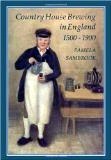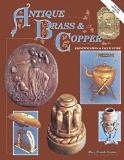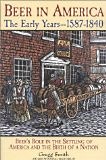-
History of:
- Resources about:
- More:
- Baby walkers
- Bakehouses
- Bed warmers
- Beer, ale mullers
- Besoms, broom-making
- Box, cabinet, and press beds
- Butter crocks, coolers
- Candle snuffers, tallow
- Clothes horses, airers
- Cooking on a peat fire
- Drying grounds
- Enamel cookware
- Fireplaces
- Irons for frills & ruffles
- Knitting sheaths, belts
- Laundry starch
- Log cabin beds
- Lye and chamber-lye
- Mangles
- Marseilles quilts
- Medieval beds
- Rag rugs
- Rushlights, dips & nips
- Straw mattresses
- Sugar cutters - nips & tongs
- Tablecloths
- Tinderboxes
- Washing bats and beetles
- Washing dollies
- List of all articles
Subscribe to RSS feed or get email updates.

Pamela Sambrook, Country House Brewing in England, 1500-1900 from Amazon.comor from Amazon UK

Flip, in those days, was a favourite and fashionable liquor, especially among the New England settlers....Put into a quart of beer a tablespoonful of brown sugar, warm it thoroughly by stirring it round with a red hot poker; add from a gill to half a pint of old Antigua rum; grate on half a nutmeg; our grandfathers thought it a capital beverage.
Charles Miner, History of Wyoming, 1845
Mary Gaston, Antique Brass & Copper from Amazon.comor from Amazon UK
Gregg Smith, Beer in America: The Early Years--1587-1840, from Amazon
The English labourer, according to my experience, prefers to warm his supper ale with a red-hot poker.
Walter Johnson, Folk Memory, 1908
..those good old days when it was thought best to heat the poker red hot before plunging it into the mugs of flip. This heating of the poker has been disapproved of late years, but I do not know on what grounds; if one is to drink bitters and gins and the like....I do not know why one should not make them palatable and heat them with his own poker.
Charles Dudley Warner, Backlog Studies, 1872
Ale mullers and beer warmers
Warming beer and mulling ale at the fireside - tin and copper mullers, hot pokers or flip-irons
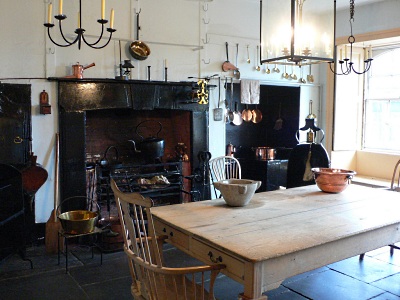 In this photo* of a 1790s English
kitchen are two different brass containers for warming beer. If you want to try
spotting them yourself before reading on, look on the wall to the right of the fireplace
and on the mantelshelf. Attractive copper antiques now - but once they were used
for warming and mulling ale. Why was beer warmed? And how?
In this photo* of a 1790s English
kitchen are two different brass containers for warming beer. If you want to try
spotting them yourself before reading on, look on the wall to the right of the fireplace
and on the mantelshelf. Attractive copper antiques now - but once they were used
for warming and mulling ale. Why was beer warmed? And how?
In England and other beer-drinking countries warm ale was a popular winter drink when heated on its own or mulled with spice and sugar. Many people also thought ale was healthier drunk warm. And then there was a fondness for sweetened warm ale with nutmeg. If you added a measure of rum or brandy the mixture was called flip, and was popular on both sides of the Atlantic in the 17th, 18th and 19th centuries.
...when I did always drink cold beer...I was very often troubled with exceeding pain in the head...also with stomach-ache, tooth-ache, cough, cold, and many other rheumatic diseases.. But since my drinking my beer (small or strong) actually as hot as blood, I have never been troubled with any of the former diseases, but have always continued in very good health constantly...
F.W., A Treatise of Warm Beer, 1641
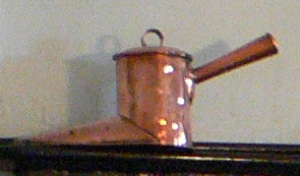 In England, although mulled ale was popular,
and there were recipes for flip in cookery books, it was sometimes seen as slightly
disreputable, associated with boisterous sailors from the 17th century on.** 19th
century writers also thought it suitable for the lower classes at Christmas. There
doesn't seem to have been this feeling amongst settlers in America. Flip is mentioned
in the memoirs of respectable New Englanders.
In England, although mulled ale was popular,
and there were recipes for flip in cookery books, it was sometimes seen as slightly
disreputable, associated with boisterous sailors from the 17th century on.** 19th
century writers also thought it suitable for the lower classes at Christmas. There
doesn't seem to have been this feeling amongst settlers in America. Flip is mentioned
in the memoirs of respectable New Englanders.
Flip, a sort of Sailor's Drink, made of Ale, Brandy, and Sugar.
Nathan Bailey, An universal etymological English dictionary, 1721
Connecticut, 1820s: The boys heated the flip-irons and passed around the cider and flip, while Aunt Esther and the daughters were as busy in serving the doughnuts, cake, and cheese.
Wm C Beecher and Rev. Samuel Scoville, A Biography of Rev. Henry Ward Beecher, 1888
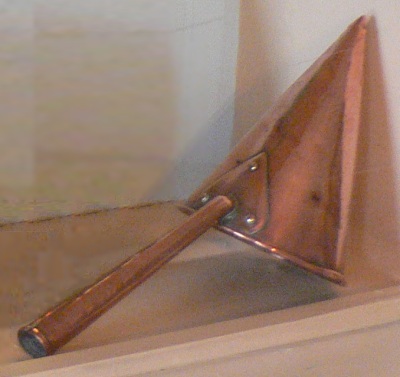 Men drinking in an inn or at home by the
hearth didn't necessarily want to wait for someone in the kitchen to warm up ale
or flip in a pan. They used a hot poker from the fire. You can see this re-created,
complete with hissing sound effects, in
A Man for All Seasons
Men drinking in an inn or at home by the
hearth didn't necessarily want to wait for someone in the kitchen to warm up ale
or flip in a pan. They used a hot poker from the fire. You can see this re-created,
complete with hissing sound effects, in
A Man for All Seasons
when Cromwell sticks a poker into a tall pewter tankard of ale before giving it
to a visitor. Slightly more hygienic, and avoiding any burnt taste, were the flip-irons
set aside for warming drinks. They may have gone from jug to jug, tankard to tankard,
but at least they didn't have ash on. Some had rounded heads, like the iron rods
used to heat pots of tar, and were called loggerheads. Flip-dog and hottle are other
names you may come across.
In a little inn, in a small village in one of the western counties of England, a group of men were assembled [in] the tap-room, where the fire was blazing very comfortably, and serving the purpose of keeping the poker at that degree of red heat necessary to warm a pot of beer when inserted therein.
James Hannay, King Dobbs, 1849
So was there a better way? In the UK two styles of ale muller or beer warmer developed, probably during the 18th century. Both could be used at the fireside. One was boot-shaped. You could stick the "toe" into the fire and let the heat spread through the ale inside. (Called boots or slippers, sometimes shoes.) The other style was a simple cone to be stuck point-down into the heat from the top of the fire. Perhaps these would work best on a coal fire, although you could press them into a deep pile of glowing ash from a log fire. They were particularly widespread in 19th century Britain, where coal fires were the norm.
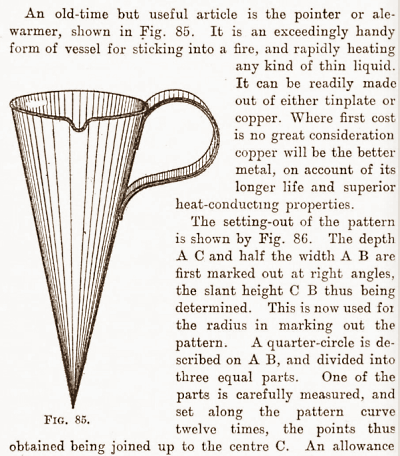 You could buy
simple tin mullers as well as lovely shiny copper ones. Sambrook's
Country House Brewing in England
You could buy
simple tin mullers as well as lovely shiny copper ones. Sambrook's
Country House Brewing in England
shows an 1898 catalogue offering two-pint tin cones at 24 shillings a dozen, while
the same money would not pay for five copper cone mullers - available in one and
one-and-a-half pint sizes too. Her book also shows a boot-shaped muller made of
sheet iron.
"Then," said Mr. Codlin, "fetch me a pint of warm ale..."
...the landlord retired to draw the beer, and presently returning with it, applied himself to warm the same in a small tin vessel shaped funnel-wise, for the convenience of sticking it far down in the fire and getting at the bright places. This was soon done, and he handed it over to Mr. Codlin with that creamy froth upon the surface which is one of the happy circumstances attendant upon mulled malt.
Charles Dickens, The Old Curiosity Shop, 1841
Over time the attractive copper ale mullers became something people enjoyed seeing around a fireplace. Along with well-polished warming pans, aka bed warmers, copper kettles, toasting forks etc. a copper ale muller developed an aura of comfortable tradition, evoking a cosy past when the hearth was warm.
This vessel was of copper — an ale-warmer, though the common name for the article was "the devil". This "devil" now only hangs on the walls of inns as a relic of bygone times, because, I am told, not only are hot ales less asked for, but landlords and landladies are averse to the trouble of making such drinks.
Letter from Nottinghamshire, Notes and Queries, 1906
Bierwärmer - German beer warmer - a clean alternative to the poker?
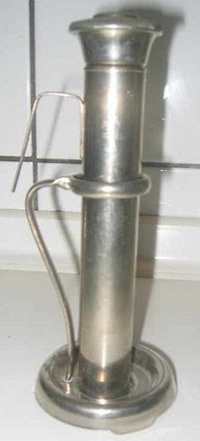 In Germany and Austria some people
warm their beer with a Bierwärmer, although they may be seen as old-fashioned. It's
a tube that you fill with boiling water before putting it in your mug. It has a
hook to hang it over the side, often with a stand to hold it when it's not in the
beer. Old ones are tin (see picture); fancier ones were made of opalescent glass,
or even silver. Some people used to use a metal rod that was heated in boiling water.
There are some vintage mid-20th century
electric immersion beer warmers too. Inns used to keep beer warmers for
customers' drinks, but this has died out as it contravenes modern hygiene regulations.
In Germany and Austria some people
warm their beer with a Bierwärmer, although they may be seen as old-fashioned. It's
a tube that you fill with boiling water before putting it in your mug. It has a
hook to hang it over the side, often with a stand to hold it when it's not in the
beer. Old ones are tin (see picture); fancier ones were made of opalescent glass,
or even silver. Some people used to use a metal rod that was heated in boiling water.
There are some vintage mid-20th century
electric immersion beer warmers too. Inns used to keep beer warmers for
customers' drinks, but this has died out as it contravenes modern hygiene regulations.
[In 1930s Vienna the musician Guido Adler] ...had the waiter bring him a 'beer-warmer' (an iron rod removed from a pot of boiling water and stuck into the beer glass).
Edward R. Reilly, Gustav Mahler and Guido Adler: Records of a Friendship
More than one
stainless steel beer warmer
of the German "hot water bottle" type is currently available. Some are promoted
as protecting stomachs which can't tolerate cold beer. Are these being bought by
people who remember beer warming in "the old days", or by a new generation of cask
ale connoisseurs? Brewers sometimes suggest an ideal temperature for bringing out
the flavour of their beer. Is this a good way of bringing beer to a state of perfection?
*Photos of kitchen and copper mullers taken for
Heather's Travel Blog
**See Congreve's Love for Love, 1695, for a flip-drinking sailor
 07 Feb 2011
07 Feb 2011
You may like our new sister site Home Things Past where you'll find articles about antiques, vintage kitchen stuff, crafts, and other things to do with home life in the past. There's space for comments and discussion too. Please do take a look and add your thoughts. (Comments don't appear instantly.)
For sources please refer to the books page, and/or the excerpts quoted on the pages of this website, and note that many links lead to museum sites. Feel free to ask if you're looking for a specific reference - feedback is always welcome anyway. Unfortunately, it's not possible to help you with queries about prices or valuation.


